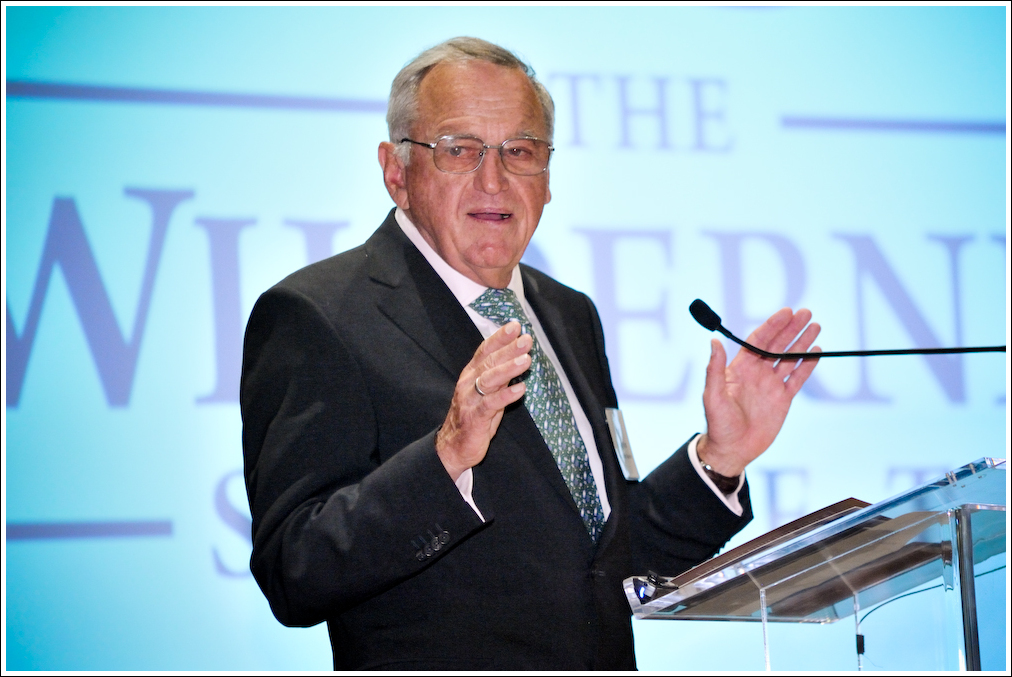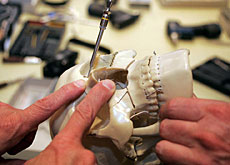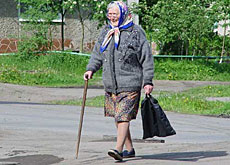Bernese billionaire works to keep West wild

Hansjörg Wyss is one of the richest people on the planet – of which he is also a passionate defender.
The Bern-born entrepreneur has been recognised by the Wilderness Society for his long-term environmental philanthropy in the United States. His work on land conservation in the West has earned him this year’s prestigious Robert Marshall Award.
Wyss, president and majority shareholder of Synthes, a multinational medical device manufacturer based in canton Solothurn and Pennsylvania, is not an easy man to track down.
He spends two-thirds of his time in the US, “the rest in Switzerland and elsewhere around the world”.
Wyss is ranked 121st on the 2010 Forbes list of richest people in the world and has a fortune estimated at $6 billion (SFr5.25 billion)
He owns several houses dotted around the world but changed his main residence from Pennsylvania to Wyoming to be nearer his daughter and granddaughter.
Changing times
South of Grand Teton National Park, Wyss also gets closer to the countryside which made such an impression on him as a young man and which he now helps preserve.
“I first came to the United States in 1958. I was 22 and on a four-month-summer professional exchange programme,” he told swissinfo.ch.
“Among the things I did was be part of a crew who surveyed roads west of Denver. I fell in love with the beauty of the West; it was a kind of landscape I had never seen before.”
At the time, the region was still part of the “Far West”. “The West was mentally far, far away from Europe, even from Washington, yet people were extremely friendly and open,” he said.
“The Grand Canyon was still unspoiled territory – there was only one bus a day into the canyon with 30 people aboard.”
Since then, pressure has increased on the majestic landscapes of Arizona and Montana.
“Today, you have five million visitors who go to see the Canyon every year. There’s terrific growth in Western communities due to huge population growth – you see a lot of huge suburbs that don’t have much of a soul and people live in much more isolation than before,” Wyss said.
Exploitation
With pressure comes danger. In July, an ExxonMobil pipeline under the Yellowstone River in south-central Montana ruptured and dumped up to 1,000 barrels of oil, fouling the riverbank and forcing water intakes downstream to close.
Across the region, the natural spaces – even public spaces – are being attacked by forestry companies, mining companies and oil and nuclear companies who want to exploit the area’s resources or to store waste.
The Wyss Foundation focuses exclusively on protecting natural spaces in the West.
“Land owned by the federal government is managed for various interests, including hydraulic power, coal and gas, forestry etc. So it needs some kind of counterbalance so it doesn’t get ruined everywhere,” he said.
His foundation does this by making the federal authorities aware of the issue and by creating partnerships between the US government and conservation groups which work to preserve natural zones.
However, the political climate is against them and the Wyss Foundation, like other ecological organisations, faces a pro-industry Republican majority in Congress and a president who has disappointed the Greens.
While deploring “the agenda of the Republican party [which] is against nature protection”, he said he would rather not comment on President Barack Obama’s attitude towards the environment. “I’d rather not go there, it’s a very thorny issue right now.”
Swiss influence
Why does Wyss not get involved in protecting nature in Switzerland?
“Switzerland was already very developed when we started. There were dams, ski resorts so it was hard to do things. The fact is that in Switzerland there’s no chance to preserve anything anymore – yes, the mountains will stay there, but you can’t create parks in the valleys.”
Nevertheless, he stresses that his love of nature developed in Switzerland.
“Bern was half the size it is today so it was even more easy than today to walk and be very quickly in nature.”
Modest upbringing
Wyss grew up in modest surroundings. His father was a salesman, “my mother a housewife who hated housework”.
Along with his parents and two sisters, he lived in a “very small” apartment, “but my parents were extremely interested in what happened in the world so we all had very lively discussions”.
“We had very little money but my family was mentally rich, I had the most exciting youth and it made me think very independently,” he said.
What does it mean to him to be worth an estimated $6 billion? “It’s unimportant, actually it doesn’t feel like anything. I have the same friends I had before, I still take local transportation in Bern. Yes, I have a couple of nice houses, but I could not afford them before.”
He adds that he feels equally at home in the US and in Switzerland. “I feel at home wherever I have friends.”
Wyss the entrepreneur
1936 Born in Bern. His father was a mechanical calculator salesman.
1958 Discovers the American outback during a student exchange trip.
1959 Graduates with an engineering degree from the Federal Institute of Technology in Zurich.
1963-65 Gains MBA from Harvard University.
1965-1969 Positions include plant engineer and project manager for Chrysler in Pakistan, Turkey and the Philippines.
1977 Appointed president of Synthes, a Swiss manufacturer of medical equipment, and guides it as it becomes the leading company of implants for mending bone fractures.
2011 Agreement by Johnson&Johnson to take over Synthes in 2012.
Wyss the environmentalist
1989 Creates the Wyss Foundation which goes on to buy and place several million hectares of land under government protection in the western US.
2000 Buys a ranch in California where he creates an eco-vineyard.
2009 Donates $125 million to Harvard for a Wyss Institute of “biologically inspired” engineering for medical purposes
Wyss the billionaire
Has a fortune of around $6.4 billion.
One of two richest men in Switzerland and one of the wealthiest in the world.
Ranked 154th in Forbes’ billionaires list for 2011.
The Robert Marshall Award honours people for service to and influence on conservation and the “fostering of an American land ethic”. Its namesake, Marshall, was one of the founders of the Wilderness Society in 1935, and a prominent thinker and leader in the wilderness movement in the 1920s and 1930s.
Hansjörg Wyss and the Wyss Foundation were given the award for “tireless” efforts to protect over four million acres through their sponsorship of partnerships between non-governmental organisations and the federal government.“Hansjörg has been steadfastly committed to keeping our public lands pristine for future generations,” said the award organisation.
Wyss was the 26th winner of the award.
(Adapted by Thomas Stephens)

In compliance with the JTI standards
More: SWI swissinfo.ch certified by the Journalism Trust Initiative



You can find an overview of ongoing debates with our journalists here. Please join us!
If you want to start a conversation about a topic raised in this article or want to report factual errors, email us at english@swissinfo.ch.